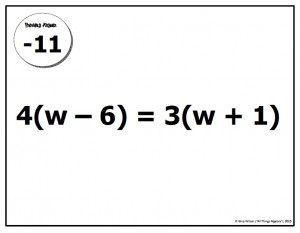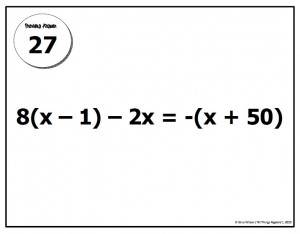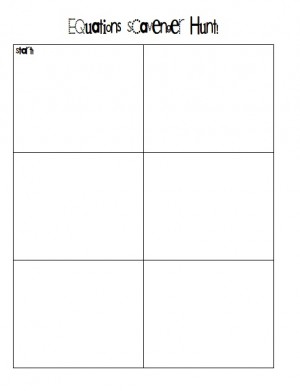Spicing up the Secondary Math Classroom: #2 – Scavenger Hunts!

This is the second post in a series I created called “Spicing up the Secondary Classroom.” This post’s focus is Scavenger Hunts! I went to a conference four years ago and listened to a speaker taught about a a similar activity in which students solved problems in loop. I was totally intrigued and decided to try it out with my students the following year. I called it a “Scavenger Hunt” and chose multi-step equations as the topic of my very first year. They are simply in nature, and really get kids up and moving. A perfect fit! Most of my scavenger hunts are 12-20 problems. Each problem goes on its own sheet of paper. Here’s a sample:

Students would write this problem down on their recording worksheet and solve it. The answer to this particular one is 27, so they look around the room for the problem with 27 in the corner. I even put problems in the hallway! This becomes their next problem.

They continue moving through the problems until they have completed them all. If they end up at a problem they have already done, that means they made a mistake somewhere along the way. I always hold an answer key with me so I can help them identify which one, they have them fix that and continue correctly. I love scavenger hunts because they truly are student led. They love being able to work with their peers and it truly is a game to them. It gives me the chance to move about freely and help address individual student needs. Here’s a sample of a recording worksheet. The worksheet is very basic and you could probably just have students use a notebook sheet of paper. Some students need a defined space to work in to keep it all organized. I will, on occasion, collect the sheets for a simple classwork grade.

If you haven’t tried scavenger hunts in your classroom, I highly recommend them! I have close to 30 available in my store if you want to check them out. Or, try creating your own! Select a topic, create 12-20 problems, and just place one problem per page, putting the answer to each one on the following page. Be very careful not to repeat answers though! That can cause big problems with students caught in an infinite loop. Other than that, they are very easy to put together and run.
~Gina~
All Things Algebra
